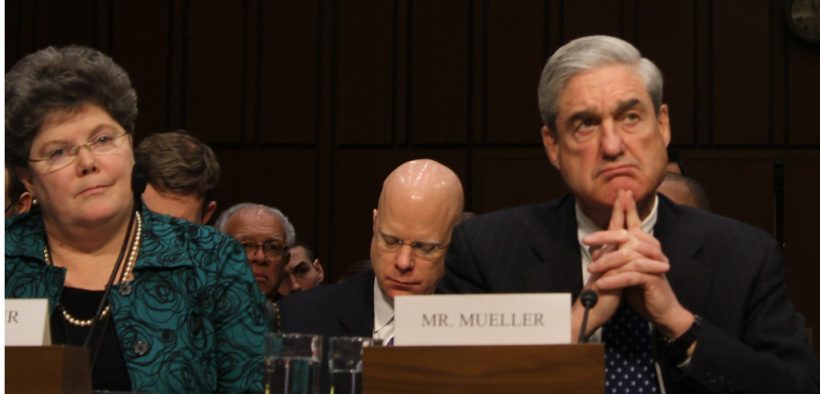Inside The Mueller: Papadopoulos And Page’s Actions Detailed

This is the third entry in a multi-part series which takes an in-depth look at the Mueller Report. The first two can be found at the following. 1, 2.
During the campaign, a visit to Russia to discuss the Trump-Moscow project arose multiple times between then-candidate Donald Trump and his staff, as the Mueller Report stated.
“The investigation identified evidence that, during the period the Trump Moscow project was under consideration, the possibility of candidate Trump visiting Russia arose in two contexts.
“First, in interviews with the Office, Cohen stated that he discussed the subject of traveling to Russia with Trump twice: once in late 2015; and again in spring 2016. According to Cohen, Trump indicated a willingness to travel if it would assist the project significantly. On one occasion, Trump told Cohen to speak with then-campaign manager Corey Lewandowski to coordinate the candidate’s schedule. Cohen recalled that he spoke with Lewandowski, who suggested that they speak again when Cohen had actual dates to evaluate. Cohen indicated, however, that he knew that travel prior to the Republican National Convention would be impossible given the candidate’s preexisting commitments to the Campaign.”
Russian Government Related Communication With Trump Staffers
The Mueller Report detailed former Trump aide George Papadopoulos’ various meetings, and also confirmed the Mueller investigation was sparked by a meeting between him and Australian diplomat Alexander Downer.
“As Papadopoulos later stated to the FBI, [Joseph] Mifsud said that the ‘dirt’ was in the form of ’emails of Clinton,’ and that they ‘have thousands of emails,'” the report details in a section labeled George Papadopoulos Learns That Russia Has “Dirt” in the Form of Clinton Emails.
“On May 6, 2016, 10 days after that meeting with Mifsud, Papadopoulos suggested to a representative of a foreign government that the Trump Campaign had received indications from the Russian government that it could assist the Campaign through the anonymous release of information that would be damaging to Hillary Clinton,” the section continues.
The following comes from a section entitled Russia-Related Communications with The Campaign:
While he was discussing with his foreign contacts a potential meeting of campaign officials with Russian government officials, Papadopoulos kept campaign officials apprised of his efforts. On April 25, 2016, the day before Mifsud told Papadopoulos about the emails, Papadopoulos wrote to senior policy advisor Stephen Miller that “[t]he Russian government has an open invitation by Putin for Mr. Trump to meet him when he is ready,” and that “[t]he advantage of being in London is that these governments tend to speak a bit more openly in ‘neutral’ cities. On April 27, 2016, after his meeting with Mifsud, Papadopoulos wrote a second message to Miller stating that “some interesting messages [were] coming in from Moscow about a trip when the time is right. The same day, Papadopoulos sent a similar email to campaign manager Corey Lewandowski, telling Lewandowski that Papadopoulos had “been receiving a lot of calls over the last month about Putin wanting to host [Trump] and the team when the time is right.
Papadopoulos’s Russia-related communications with Campaign officials continued throughout the spring and summer of 2016. On May 4, 2016, he forwarded to Lewandowski an email from Timofeev raising the possibility of a meeting in Moscow, asking Lewandowski whether that was “something we want to move forward with.” The next day, Papadopoulos forwarded the same Timofeev email to Sam Clovis, adding to the top of the email “Russia update.”
Carter Page’s Visit To Russia
The section labeled ‘Carter Page’s July 2016 Trip To Moscow’ details the curious trip he took to Russia and the communications he did and may have had with Russian officials close to President Vladimir Putin while in the country. The following highlights important aspects of the report.
Page’s affiliation with the Trump Campaign tools on a higher profile and drew the attention of Russian officials after the candidate named him a foreign policy advisor. As a result, in late April 2016, Page was invited to give a speech at the July 2016 commencement ceremony at the New Economic School (NES) in Moscow. …
In early July 2016, Page traveled to Russia for the NES events. On July 5, 2016, Denis Klimentov, copying his brother, Dmitri Klimentov, emailed Maria Zakharova, the Director of the Russian Ministry of Foreign Affairs’ Information and Press Department, about Page’s visit and his connection to the Trump Campaign. Denis Klimentov said in the email that he wanted to draw the Russian government’s attention to Page’s visit in Moscow. His message to Zakharova continued: “Page is Trump’s adviser on foreign policy. He is a known businessman; he used to work in Russia…. If you have any questions, I will be happy to help contact him.” Dmitri Klimentov then contacted Russian Press Secretary Dmitry Peskov about Page’s visit to see if Peskov wanted to introduce Page to any Russian government officials.” The following day, Peskov responded to what appears to have been the same Denis Klimentov-Zakharova email thread. Peskov wrote, “I have read about [Page]. Specialists say that he is far from being the main one. So I better not initiate a meeting in the Kremlin.’ …
The Office was unable to obtain additional evidence or testimony about who Page may have met or communicated within Moscow; thus, Page’s activities in Russia—as described in his emails with the Campaign—were not fully explained.
Mueller would state that Page’s testimony was contradictory and confusing, but did not establish enough evidence to prove he helped coordinate election interference.







